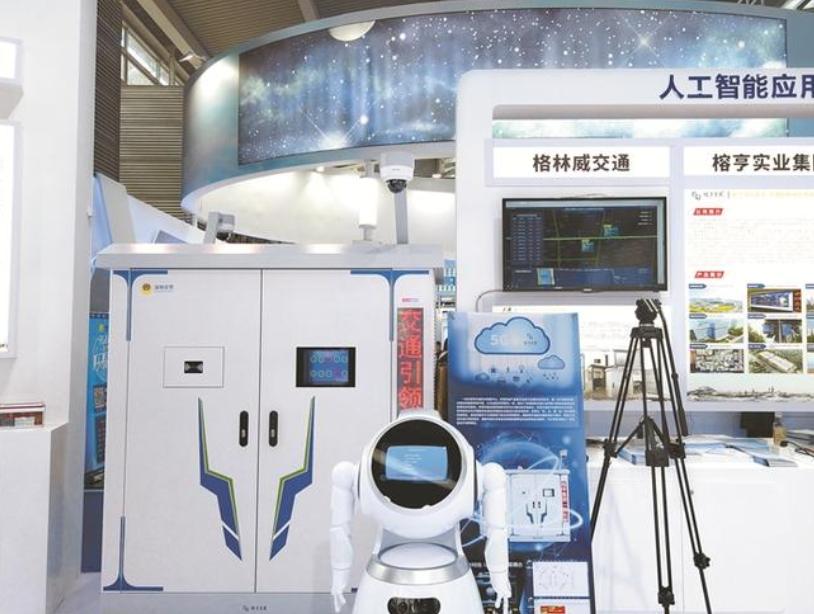Luohu showcases strengths in AI and life health
 0 Comment(s)
0 Comment(s) Print
Print E-mail China.org.cn, November 19, 2019
E-mail China.org.cn, November 19, 2019

More than 30 enterprises and institutes working in artificial intelligence and life health from a Luohu base are showing off their latest innovation achievements at the 21st China Hi-Tech Fair opening Nov. 13 in Shenzhen.
The annual event is jointly hosted by relevant central government departments and the Shenzhen municipal government every year, as the largest and most influential of its kind in the country.
With a theme of "Invigorating the Greater Bay Area through Opening-up and Innovation", the five-day fair has attracted more than 3,000 enterprises, nearly 200 institutes, almost 100 universities and over 20 innovation centers from more than 40 countries.
Luohu is using the opportunity to show its research and development strengths in the AI and life health sectors and attract new investment.
A host of leading players have achieved much development in recent years in the district, thanks in part to its pro-innovation business environment.
"Combined with certain algorithms, the artificial intelligence internet of things, or AIOT, can help identify some uncivilized behaviors, such as talking on the phone while driving, smoking while driving and casually parking bikes, making the technology useful in keeping good order in public places," said Wei Changke, executive partner of the Shenzhen 7G Intelligence Network Company, a leading AIOT player.
The company works together with Shenzhen Customs, helping the latter to build the first smart customs operations control system in the country. Its technology is also widely used in the construction of smart streets in Shenzhen, Guangzhou and Nanjing, etc.
Wei said the emerging industries have great development potential in Luohu, and the company hoped to realize even bigger development in the district, where enterprises are well served and can fully concentrate on advancement.
Over the past three years, the total operational revenue of strategic emerging enterprises in Luohu has surged three-fold, and the number of national-level high and new technology enterprises in the district has increased 2.3 times. The advantage of industrial clusters become evident, making the district a regional AI innovation hub in the Pearl River Delta.
Robots capable of doing many jobs on construction sites manufactured by Shenzhen Techen Technology Company have caught many people's attention in the exhibition hall of Luohu.
"The robots can help save a lot of manpower and improve the efficiency of construction work," said company manager Tian Yonggang.
"The company is a leader in the niche market, and the robots are popular among construction companies," he added.
Rongheng Group in Luohu is another pioneer in using information technology to help improve the operational efficiency of the Bus Rapid Transit system through realizing real-time communication and coordination among multi-vehicles simultaneously, so that the limited transportation capacity in rush hour can be used to the maximum.
And the generous tax cuts on offer from the Luohu government is helping such high-tech companies boost their growth.
Luohu's strengths in the AI technology also foster fast development and upgrading of its health and medical care industry, another growth pole of the district economy.
An important reason that the emerging industries can take root and quickly flourish in Luohu is that the district government pays special attention to strengthening its industrial planning and attracting investment.
"The government has stepped up its efforts in industrial planning and distribution, and expanding industrial space, and these efforts over the past few years have paid off," according to Shi Xingzhong, chief of the Luohu science and technology innovation bureau, speaking at a biweekly news conference of the district government held on the sidelines of the fair.
According to Shi, the Dawutong emerging industrial belt and the Wutong artificial intelligence town are currently two key projects to further promote the integration of the AI, life health and information technologies.
So far, the 78-square-kilometer district has built 507 base stations of the latest fifth generation telecom technology, forming one of the densest 5G base station networks in the city, laying a solid foundation for the upgrading of its industries and urban management in the foreseeable future.
It is believed that the medical care, housing, education, social governance, transport and government operation will reap more bonuses from the district government's long-term support for innovation in science and technology, which looks set to make Luohu a model in the incubation of a smart city.






Go to Forum >>0 Comment(s)